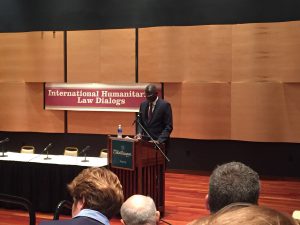By: Olivia Youn and Emily Brewster

From left: Emily Brewster and Olivia Youn with Judge Christine van den Wyngaert, and Professors Valerie Oosterveld, David Crane, and Leila Sadat
We had the honor of attending the 11th International Humanitarian Law Dialogs in Chautauqua, New York last month. Since the first IHL Dialogs in 2007, these discussions have fostered meaningful conversations on contemporary international law. The theme of this year’s Dialogs, “Changing Times: New Opportunities for International Justice and Accountability,” is an appropriate response to an ever-growing list of recent humanitarian crises, particularly in the Middle East and Africa.
The Dialogs kicked off with the premiere screening of the film “Never Again: Forging a Convention for Crimes Against Humanity,” presented by Professor Leila Sadat of Washington University School of Law and the Whitney R. Harris World Law Institute. The film included interviews of victims from various regions across the globe including the Democratic Republic of the Congo, North Korea, Iraq, and Syria, among others. It was an in-depth look into how crimes against humanity affect people on a national, communal, and individual level. “Never Again” advocated for us to recognize the terrible crimes and to take action. After the film, Kevin Hughes, Robert Petit, and Judge Christine Van den Wyngaert gave their thoughts on the film and took questions from the audience.
In the evening, Zainab Bangura, former Special Representative of the Secretary-General on Sexual Violence in Conflict and Minister of Health and Sanitation for the Government of Sierra Leone, received the prestigious Joshua Heintz Award for Humanitarian Achievement. In light of the devastating mudslides in Sierra Leone that killed over 1,000 people last month, Ms. Bangura was unable to receive the award in person, but sent a heartwarming video message accepting this honor.

The Extraordinary Chambers in the Courts of Cambodia prosecutors from left to right: Robert Petit, Andrew Cayley, and Nicholas Koumjian.
The evening panel focused on the ECCC Office of the Prosecutor, led by former and current prosecutors from the Extraordinary Chambers in the Courts of Cambodia, Nicholas Koumjian, Robert Petit, and Andrew Cayley. The court deals with crimes that occurred during the Khmer Rouge regime, resulting in the death of at least 1.7 million in the mid-to-late ‘70s, igniting the Cambodian Civil War. The death toll from this communist-era conflict compares to that of the Holocaust. The prosecutors discussed the inter-workings of a hybrid-model court and the internal conflicts of domestic judges. They addressed the fact that many domestic judges feel pressured from the government to shy away from certain decisions, while international judges are largely free from that kind of pressure.
The Dialogs continued on August 28th with the Impunity Watch Essay Contest Award Ceremony given to high school student, Andrina Kirst. The contest provided entering high school students a chance to become involved in humanitarian work and peace efforts through scholarship. Following the awards ceremony, the Dialogs provided lectures from members of the international community discussing their work and contribution to humanitarian efforts.

Secretary General Elhadj As Sy of the International Federation of the Red Cross and Red Crescent Societies (IFRC) delivers the keynote address.
First, Secretary General Elhadj As Sy of the International Federation of the Red Cross and Red Crescent Societies (IFRC) delivered the keynote address. He discussed the importance of the Red Cross’s activities during natural disasters and its help in times of discord in unstable nations. His address called for the protection of individuals who go into volatile areas to provide humanitarian assistance but face dangers every day. Later, the United Kingdom’s Director of Service Prosecutions, Andrew Cayley, discussed his office’s efforts to investigate and prosecute war crimes committed by British soldiers during the Iraq War of 2003. There were also panels by current prosecutors of the international tribunals and a round table discussion on new opportunities for international justice and accountability. The most interactive of the panels came in the “porch session” – conversations between the prosecutors and various students in attendance. The prosecutors addressed career and duty questions from 8th graders to law students. The young students were offered a chance to ask prosecutors any pressing questions about the attorneys’ daily lives or interactions with leaders of rebellions.

Porch Session discussing Victim-Driven Approaches to International Criminal Justice featuring from left to right: Professor Valerie Oesterveld, Andrea Gittelman, Professor Milena Sterio, Professor Megan Fairlie, and Professor Jennifer Trahan.
Finally, delivering the Katherine B. Fite Lecture during dinner was Judge Christine Van den Wyngaert. She reflected on her long career leading up to being a judge on the ICC. Her lecture called for young women to become more involved in international law and international courts in the future.
